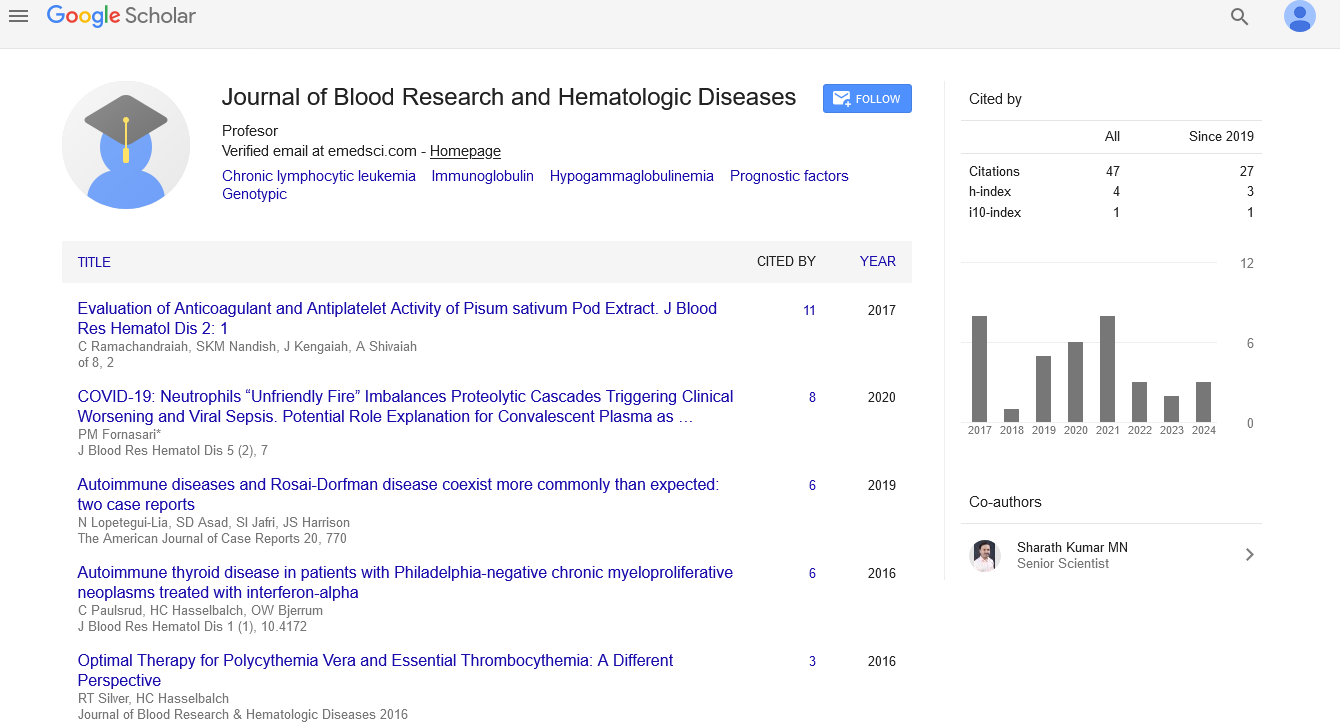Opinion Article, J Blood Res Hematol Dis Vol: 9 Issue: 1
Clarifying the Complexities of Red Blood Cell Deficiency by the Iron Equation
Graham H. Parkei*
1Department of Biomedical Engineering, Georgia Institute of Technology and Emory University, Atlanta, GA 30332, USA
*Corresponding Author: Graham H. Parkei,
Department of Biomedical
Engineering, Georgia Institute of Technology and Emory University, Atlanta,
GA 30332, USA
E-mail: parkeifhgra@gmail.com
Received date: 26 February, 2024, Manuscript No. JBRHD-24-131623;
Editor assigned date: 28 February, 2024, PreQC No. JBRHD-24-131623 (PQ);
Reviewed date: 14 March, 2024, QC No. JBRHD-24-131623;
Revised date: 21 March, 2024, Manuscript No. JBRHD-24-131623 (R);
Published date: 28 March, 2024 DOI: 10.4172/jbrhd.1000199.
Citation: Parkei GH (2024) Clarifying the Complexities of Red Blood Cell Deficiency by the Iron Equation. J Blood Res Hematol Dis 9:1.
Abstract
In the intricate web of human biology, every component plays a crucial role, none more vital than red blood cells. These microscopic heroes transport oxygen from the lungs to every corner of the body, ensuring the sustenance of life itself. Yet, when the balance is disrupted, when the iron equation tilts unfavorably, the consequences can be profound. Welcome to the world of red blood cell deficiency, where understanding the complexities of this condition becomes paramount. Before delving into deficiency, it's essential to grasp the significance of Red Blood Cells (RBCs). These cellular powerhouses are packed with hemoglobin, a protein that binds oxygen molecules. As blood circulates through the lungs, hemoglobin eagerly snatches up oxygen, embarking on a journey to nourish tissues and organs. Without an adequate supply of RBCs, this vital process is compromised, leading to a cascade of health issues.
Description
In the intricate web of human biology, every component plays a crucial role, none more vital than red blood cells. These microscopic heroes transport oxygen from the lungs to every corner of the body, ensuring the sustenance of life itself. Yet, when the balance is disrupted, when the iron equation tilts unfavorably, the consequences can be profound. Welcome to the world of red blood cell deficiency, where understanding the complexities of this condition becomes paramount. Before delving into deficiency, it's essential to grasp the significance of Red Blood Cells (RBCs). These cellular powerhouses are packed with hemoglobin, a protein that binds oxygen molecules. As blood circulates through the lungs, hemoglobin eagerly snatches up oxygen, embarking on a journey to nourish tissues and organs. Without an adequate supply of RBCs, this vital process is compromised, leading to a cascade of health issues.
At the heart of red blood cell production lies a crucial element: iron. This mineral serves as the building block for hemoglobin synthesis, making it indispensable for the formation of healthy RBCs. However, maintaining the delicate balance of iron within the body is a nuanced task. Too much or too little can disrupt the equilibrium, impacting red blood cell production and function. Red blood cell deficiency, clinically known as anemia, encompasses a spectrum of conditions characterized by a decrease in RBC count or hemoglobin levels. Iron deficiency anemia, the most common form, occurs when the body lacks an adequate supply of iron to produce hemoglobin. Other types include vitamin deficiency anemias, caused by insufficient levels of nutrients crucial for RBC production, and hemolytic anemias, where RBCs are destroyed prematurely.
Untangling the web of red blood cell deficiency requires a meticulous examination of its underlying causes. While iron deficiency is often attributed to inadequate dietary intake, it can also stem from factors such as chronic blood loss, gastrointestinal disorders impairing iron absorption, or increased iron demands during pregnancy. Similarly, vitamin deficiency anemias may arise from dietary insufficiencies or conditions hindering nutrient absorption in the gut.
The impact on health
The ramifications of red blood cell deficiency extend far beyond fatigue and weakness, its hallmark symptoms. Without an ample oxygen supply, vital organs such as the heart and brain may suffer, leading to palpitations, shortness of breath, cognitive impairment, and even heart failure in severe cases. In pregnant individuals, anemia increases the risk of complications during childbirth and can impair fetal development. Diagnosing red blood cell deficiency entails a comprehensive approach, including a thorough medical history, physical examination, and laboratory tests. Blood tests measuring hemoglobin, hematocrit, and iron levels provide valuable insights into the severity and underlying cause of the deficiency. Additional tests, such as bone marrow biopsy or imaging studies, may be warranted to identify any contributing factors.
Effective management of red blood cell deficiency hinges on addressing the underlying cause while replenishing depleted stores. In cases of iron deficiency anemia, oral iron supplements are commonly prescribed to restore iron levels and stimulate RBC production. For severe deficiencies or when oral supplementation is ineffective, intravenous iron therapy may be necessary. Vitamin deficiency anemias often require supplementation with specific nutrients, alongside dietary modifications to support long-term health. Prevention of red blood cell deficiency revolves around maintaining a balanced diet rich in iron, vitamins, and other essential nutrients. Routine screening for anemia, especially in high-risk populations, allows for early detection and intervention, minimizing the risk of complications. With timely and appropriate treatment, the prognosis for most individuals with red blood cell deficiency is favorable, emphasizing the importance of proactive healthcare management.
Conclusion
The iron equation underlying red blood cell deficiency is a multifaceted puzzle, requiring a nuanced understanding of its intricacies. From the delicate balance of iron within the body to the diverse array of underlying causes, untangling this web is essential for effective diagnosis and management. By recognizing the signs, addressing the root causes, and implementing targeted interventions, we can navigate the complexities of red blood cell deficiency and pave the way for optimal health and well-being. The multifaceted impact of red blood cell deficiency underscores the importance of timely diagnosis, comprehensive management, and preventive measures, ensuring optimal health outcomes for individuals affected by this condition.
 Spanish
Spanish  Chinese
Chinese  Russian
Russian  German
German  French
French  Japanese
Japanese  Portuguese
Portuguese  Hindi
Hindi 